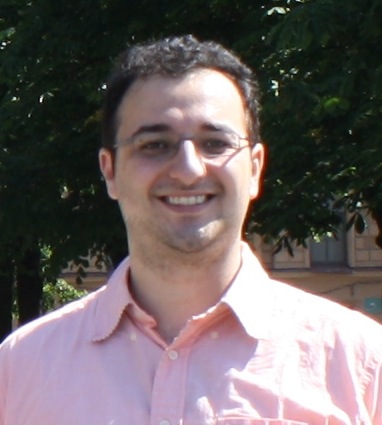[:el]Konstantinos Nektarios Gourgouliatos is a post-doctoral research associate at the Department of Applied Mathematics of the University of Leeds and member of the Astrophysical and Geophysical Fluids group. His main focus of interest is astrophysical magnetic fields and their role in high energy astrophysics and plasma physics.
Konstantinos Gourgouliatos was born in Patra, Greece in 1982. He completed his B.A. in Physics at the University of Patras in 2004. In 2005, he completed his Master of Advanced Study in Mathematics at the Department of Applied Mathematics and Theoretical Physics and in 2009, his Ph.D. with the thesis “Relativistic Magnetohydrodynamics” at the Institute of Astronomy, both at the University of Cambridge.
In 2006, he started teaching supervisions (tutorials) at undergraduate students on quantum mechanics, electromagnetism, special relativity, stellar dynamics and galaxy structure, at the Institute of Astronomy and Robinson College of the University of Cambridge and in 2007, he was teaching introductory course on Astronomy and Astrophysics for Reach Cambridge summer schools for foundation-year international students, both until 2009. In 2009, he gave lectures on the Graduate Courses: Galactic Dynamics and Large Scale Structure, Statistical Mechanics, at the Purdue University.
Konstantinos Gourgouliatos, in 2013, gave lectures on “Our Evolving Universe” at the Department of Physics of McGill University. For the period 2015-2016, he was assigned as module manager for Quantum Mechanics and Advanced Quantum Mechanics at the School of Mathematics in University of Leeds and from 2015 until 2020, he is assigned as academic development fellow at the same university.
Apart from teaching, he has also an extensive research experience. From 2009 until 2012, he was post-doctoral research associate at Purdue University, in 2012 he was research visitor at the University of Cambridge, from 2012 until 2015, he was post-doctoral fellow at the department of Physics of McGill University and from 2015 until present, he is post-doctoral research associate at the department of Applied Mathematics of the University of Leeds, supervised by Professor Serguei Komissarov and Professor R. Hollerbach.
Konstantinos Gourgouliatos was part of an international group of astronomers that discovered a neutron star, one of the densest objects in the universe and the closest thing to a black hole, suddenly slowing its spin. Neutron stars can reach speeds of up to 43.000 revolutions per minute (rpm) and can have magnetic fields a trillion times stronger than the Earth’s. This abruptly slowing neutron star, named 1E2259+586, was spinning once every 7 seconds, or about 8 rpm, and it appeared to be slowing down at a gradual and stable rate. But at the next scheduled observation on 28 April 2012, the data showed the star’s spin had abruptly slowed by 2.2 millionths of a second. The surprisingly sudden change was called an anti-glitch. All the observations were published at Nature journal.
Konstantinos Nektarios Gourgouliatos has received the 2015 Best Post-Doc Talk Prize at the UK MHD meeting in Northumbria University, has received the 2012-2014 Centre for Research in Astrophysics of Québec Fellowship from McGill University and has won the 2005-2009 Isaac Newton Studentship for study in Astronomy and Gravitation from the University of Cambridge, among many honors and scholarships.[:]




